20 Years of the Global War on Terror/ 20 Days of Education And Resources
As Catalyst Project considered how to reflect on the impacts of 9/11 and the “Global War on Terror,” there wasn’t a singular story we could tell to capture the past 20 years of attacks and resistance. This series: “20 Years of the ‘Global War on Terror,’ 20 Days of Education and Resources” is a collection of snapshots (articles, speeches, interviews) highlighting many of the impacts. The series provides resources that offer analytical framing and historical perspective. We offer these resources to support new generations of organizers to get grounded in the legacies of fighting U.S. imperialism and the lessons learned along the way.
Table of Contents
Day 1: 9/11/2001
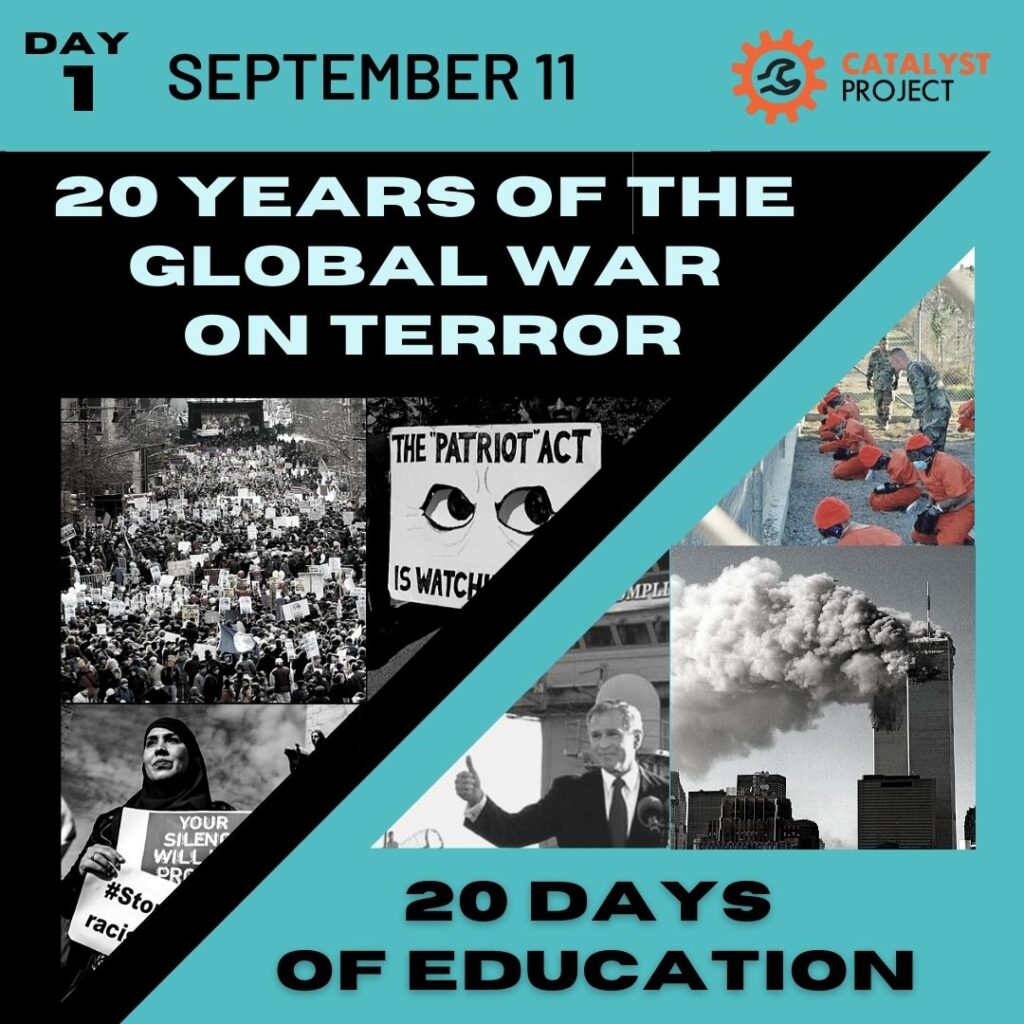
Over each of the next 20 days, we are going to share a resource highlighting one aspect of the impacts and costs of the so-called “Global War on Terror” as well as some of the powerful histories of resistance. One of the primary characteristics of this truly global war waged by the US is how invisibilized it has been made to those who are not targeted by it– by design of the warmakers, and with cooperation from the media.
On our first day, the 20th anniversary of the September 11th attacks on the World Trade Center and the Pentagon, we are sharing the poem “First Writing Since” by Suheir Hammad, a Palestinian poet from Brooklyn.
Suheir Hammad, “First Writing Since” https://www.youtube.com/watch?v=FDyLNgLHprI
Full text of “First Writing Since” https://merip.org/2001/12/first-writing-since/
Day 2: “Special Registration” and Islamophobia
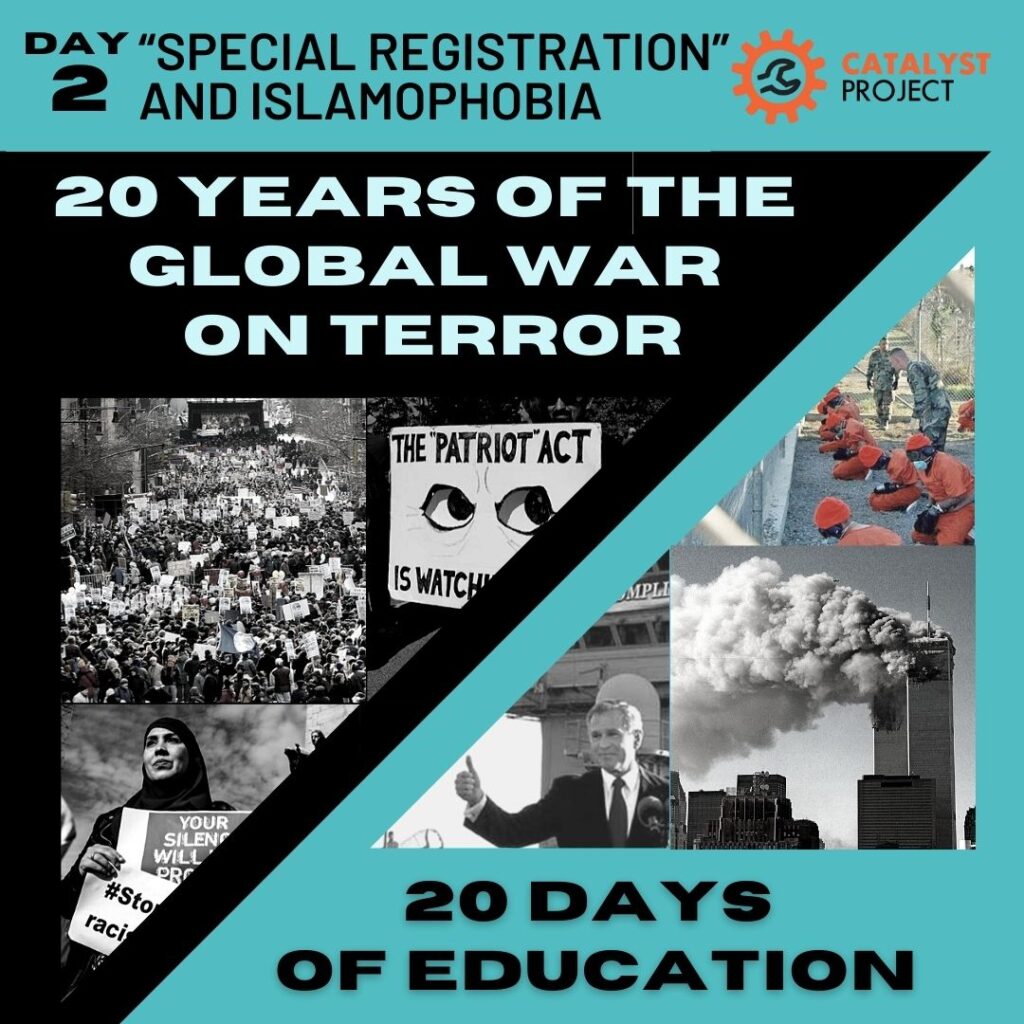
After 9/11, Islamophobia increased exponentially in the US. Thousands of Arabs, Muslims and South Asians were threatened and attacked in the streets, and hundreds were detained without cause. Eventually Bush’s Secretary of State, the notorious John Ashcroft, implemented the NSEERS program which forced 84,000 boys and men from Muslim-majority countries to “special register” with the government. 13,000 were deported for civil immigration violations. 15 years of organizing led by Arab and South Asian communities forced the program to end in the months before Donald Trump became president.
Today’s resource: “A reflection on Winning the End of ‘Muslim Registrations’” by Desis Rising Up and Moving (DRUM).
DRUM offers that we need to go beyond performative allyship to solidarity “rooted in actual strategies, needs, demands, and sites of leverage that are drawn from the concrete experiences of impacted communities and that actually disrupt the functioning of unjust systems.” What are some ways to do that in the fight against Islamophobia and the broader fight against racism?
Additional Resources:
- Yesterday DRUM released this powerful documentary history of their organizing to stop the disappearances of South Asian men and boys in the immediate aftermath of 9/11: https://www.drumnyc.org/9-11-freedom/
- Islamophobia by Justice for Muslims Collective
Organizations: DRUM (Desis Rising Up and Moving); Justice for Muslims Collective; Muslim Justice League; Vigilant Love; MPower Change
Day 3: Background of the US in the Region
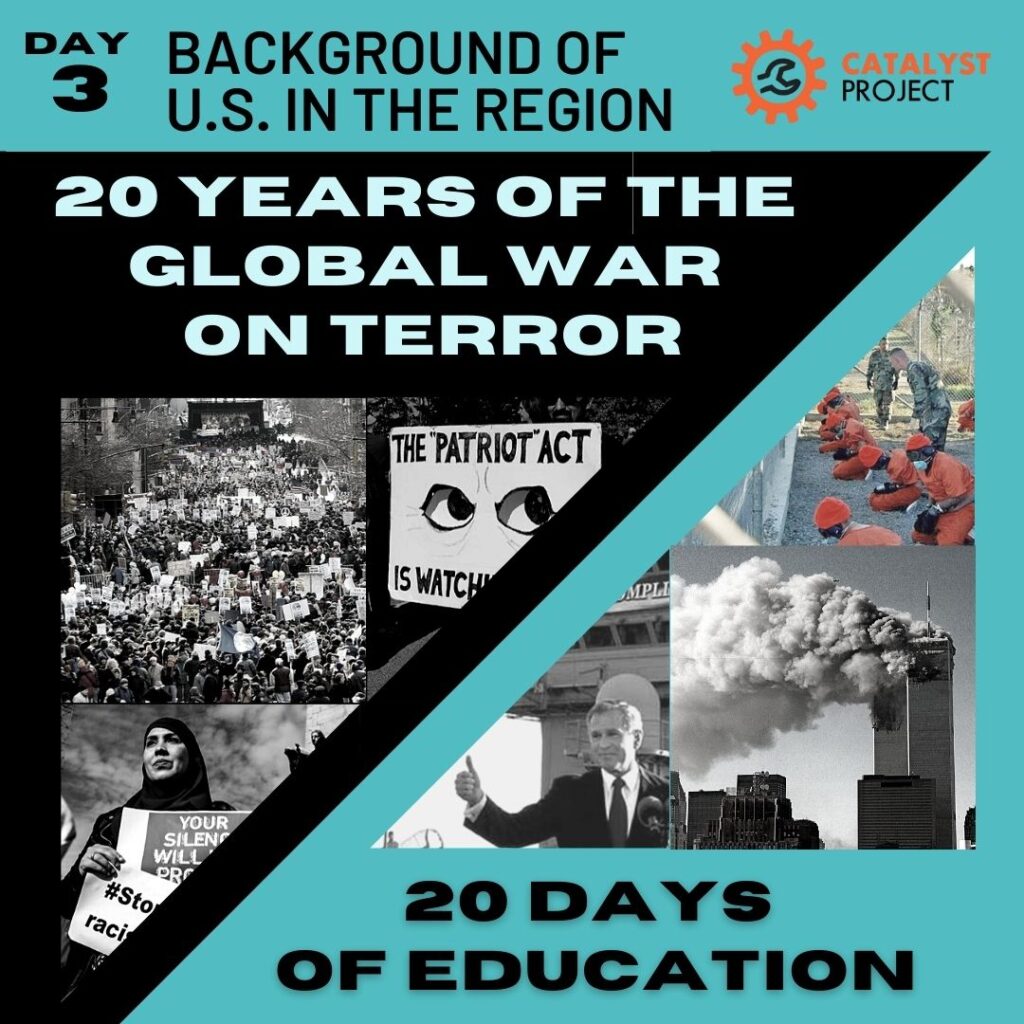
After 9/11, the mainstream media published countless think pieces asking, “Why do they hate us?” Most responses relied on racist conceptions of Islam and Arab people. Missing in most analysis was any meaningful engagement with the violence and harm the US had already perpetrated in Iraq and Afghanistan (as well as countries across the region and around the world) or the specific US economic interests at play. Also missing was the specific role the US had played in propping up Osama Bin Laden, the Taliban and Saddam Hussein, some of the very people who had now become their enemies.
How do we break through the story that 9/11 led to the “Global War on Terror,” when the truth is that the US’s terrorizing so many people around the globe led to 9/11?
Primary Resource: “Come September,” by Arundhati Roy. Full text available here.
Additional resources:
- “The United States and the Middle East: Why do “They” Hate Us” by Stephen Shalom
- “What About Those Who Were Right on Afghanistan?” by Medea Benjamin and Nicolas J.S. Davies
Day 4: Afghanistan
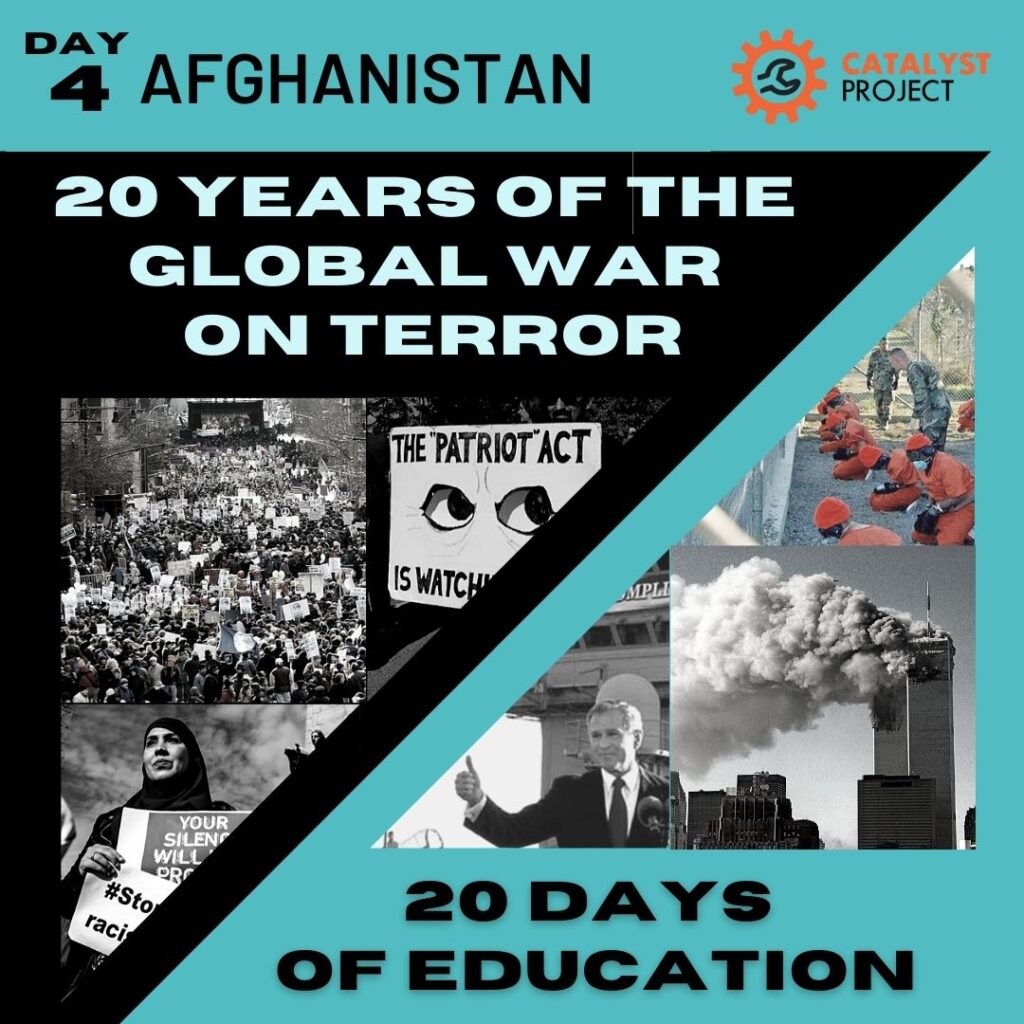
Within weeks of the 9/11 attacks, the U.S. launched its brutal “War on Terror” with the ferocious bombing and invasion of Afghanistan, toppling the Taliban. Initially, the war was sold to the U.S. population as a plan to dismantle al-Qaeda, which had claimed responsibility for the 9/11 attacks. During this 20-year war, which cost over $2 trillion dollars, hundreds of thousands of people were killed and many thousands more were maimed. The U.S. occupation of Afghanistan destabilized the country, drove it into extreme poverty and set back the progressive movements of the Afghan people.
On 9/14/2001 the Revolutionary Association of the Women of Afghanistan (RAWA) wrote: “Now that the Taliban and Osama are the prime suspects by the US officials after the criminal attacks, will the US subject Afghanistan to a military attack similar to the one in 1998 and kill thousands of innocent Afghans for the crimes committed by the Taliban and Osama? Does the US think that through such attacks, with thousands of deprived, poor and innocent people of Afghanistan as its victims, will be able to wipe out the root-cause of terrorism, or will it spread terrorism even to a larger scale?” from today’s resource: “The People of Afghanistan Have Nothing to do with Osama and his Accomplices”
Now that the US has finally withdrawn troops from Afghanistan, what is the US government’s responsibility to the people of Afghanistan? How can people in the US offer material solidarity to the people of Afghanistan?
Additional Resources:
- “I witnessed US war crimes in Afghanistan – for all its victims justice is due” by Moazzam Begg
- “Was Afghanistan the First “Feminist War”? Examining the Role of “White Feminism” in the Longest U.S. War” interview with Rafia Zakaria
- Organizations: Afghan Peace Volunteers, United Afghan Association, Afghans for a Better Tomorrow, Afghan Women’s Mission
Day 5: Iraq
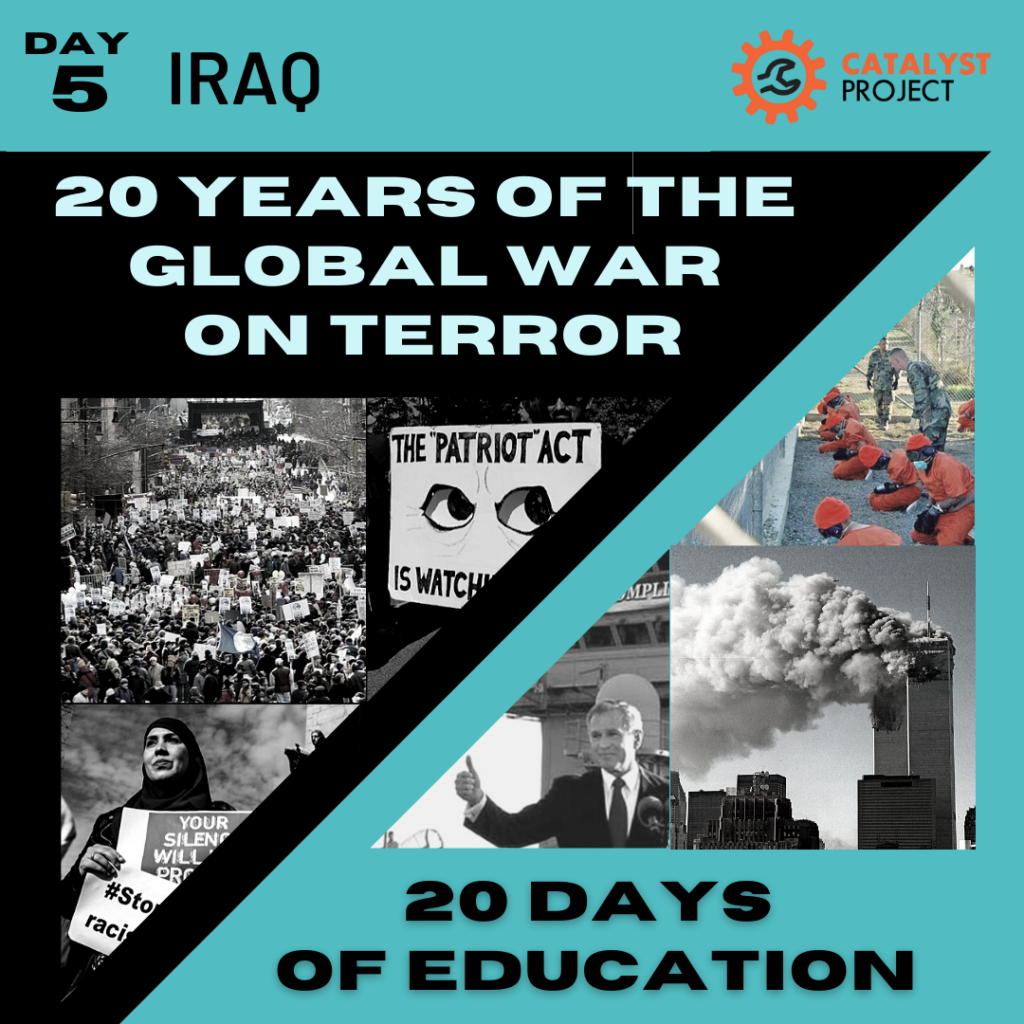
The US war on Iraq began with the 1991 invasion now known as the first Gulf War, and continued over the next 10 years of lethal sanctions. In 2003, despite the largest worldwide protests in history across every continent, the Bush administration invaded Iraq again on bogus claims that Saddam Hussein had funded Al-Qaeda and was building weapons of mass destruction. The US war and occupation of Iraq would cost well over a million lives, displace more than 9 million Iraqis, plunge Iraq into sectarian violence and create ISIS/the Islamic State/Daesh, destabilize the region, and poison the soil, air and water for coming generations. Even under tremendous repression, Iraqi progressive social movements and trade unionists have continued to organize for human rights and democracy.
Today we are sharing a quote from Riverbend, an Iraqi woman who started blogging about the war and politics starting in August of 2003. This quote is from 2007:
“And yet, as the situation continues to deteriorate both for Iraqis inside and outside of Iraq, and for Americans inside Iraq, Americans in America are still debating on the state of the war and occupation- are they winning or losing? Is it better or worse?
“Let me clear it up for any moron with lingering doubts: It’s worse. It’s over. You lost. You lost the day your tanks rolled into Baghdad to the cheers of your imported, American-trained monkeys. You lost every single family whose home your soldiers violated. You lost every sane, red-blooded Iraqi when the Abu Ghraib pictures came out and verified your atrocities behind prison walls as well as the ones we see in our streets. You lost when you brought murderers, looters, gangsters and militia heads to power and hailed them as Iraq’s first democratic government. You lost when a gruesome execution was dubbed your biggest accomplishment. You lost the respect and reputation you once had. You lost more than 3000 troops. That is what you lost America. I hope the oil, at least, made it worthwhile.”
Riverbend’s Blog is here: https://riverbendblog.blogspot.com/
Additional Resources:
- Listen to this interview with Yousef Baker (starts around 9 min in) from March 19, 2021, “The history of 21st century Iraq”
- First Victims of Freedom: An interview with Iraqi feminist Yanar Mohammed
- Against All Odds: Voices of Popular Struggle in Iraq by Ali Issa
- The Iraq War’s Oil Timeline by Antonia Juhaz (from 2006)
Organizations: OWFI – Organization of Women’s Freedom in Iraq (OWFI) , Iraqi Transnational Collective , Collective Action for Iraq
Day 6: Global Antiwar Movement
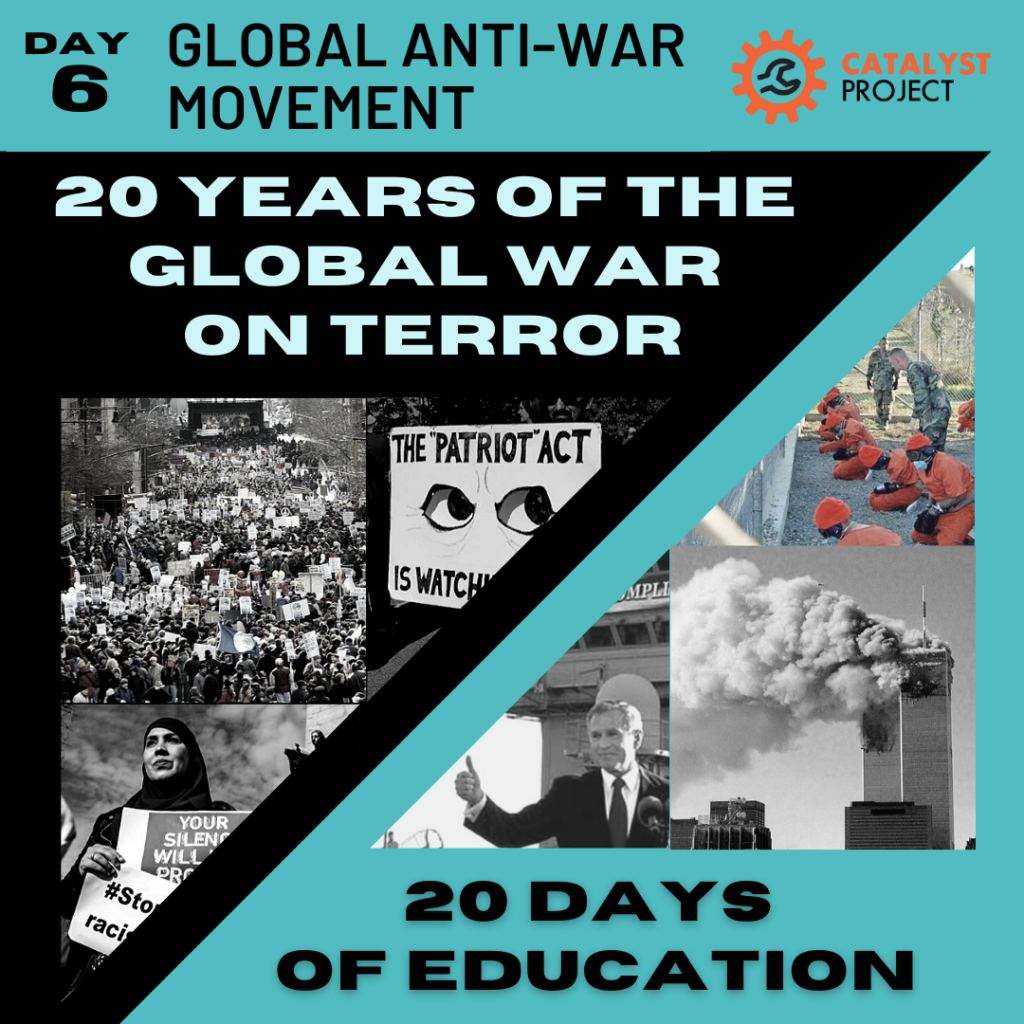
As long as the US empire has waged wars, people have resisted them from both inside and outside the empire. The global mobilization to prevent the invasion of Iraq was a high tide of resistance. On February 15th, 2003 an estimated 12-14 million people took part in protests on every continent. in the largest day of protest in history. On the day after the Bush administration launched the massive Shock and Awe bombing campaign on Iraq, protesters in cities across the US attempted to stop business as usual and raise the social cost of waging war. In San Francisco alone more than 2,500 people were arrested over several days of action that shut down the city’s financial center.
The scale of the antiwar movement was incredible, and it wrestled with many issues internally. Two of the key ones were its shortcomings around antiracism and anti-imperialism. We must reckon with the fact that the movement was unable to prevent the invasion of Iraq, as we also remember the incredible resistance to US war-making and lift up some of the organizations that continue to organize powerfully against US war and imperialism: Dissenters, Arab Resource and Organizing Center, Palestinian Youth Movement, About Face: Veterans Against the War, War Resisters League.
Today’s resources:
- February 15th, 2003. The Day the World Said No To War by Phyllis Bennis
- The Largest Protest Ever Was 15 Years Ago. The Iraq War Isn’t Over. What Happened? by Paul Blumenthal
- Protests against the Iraq War – Wikiwand
- SHUTDOWN: The Rise and Fall of Direct Action to Stop the War
- Iraq, the US and the Challenges to the Global Peace Movement by Walden Bello
Day 7: Hybrid War
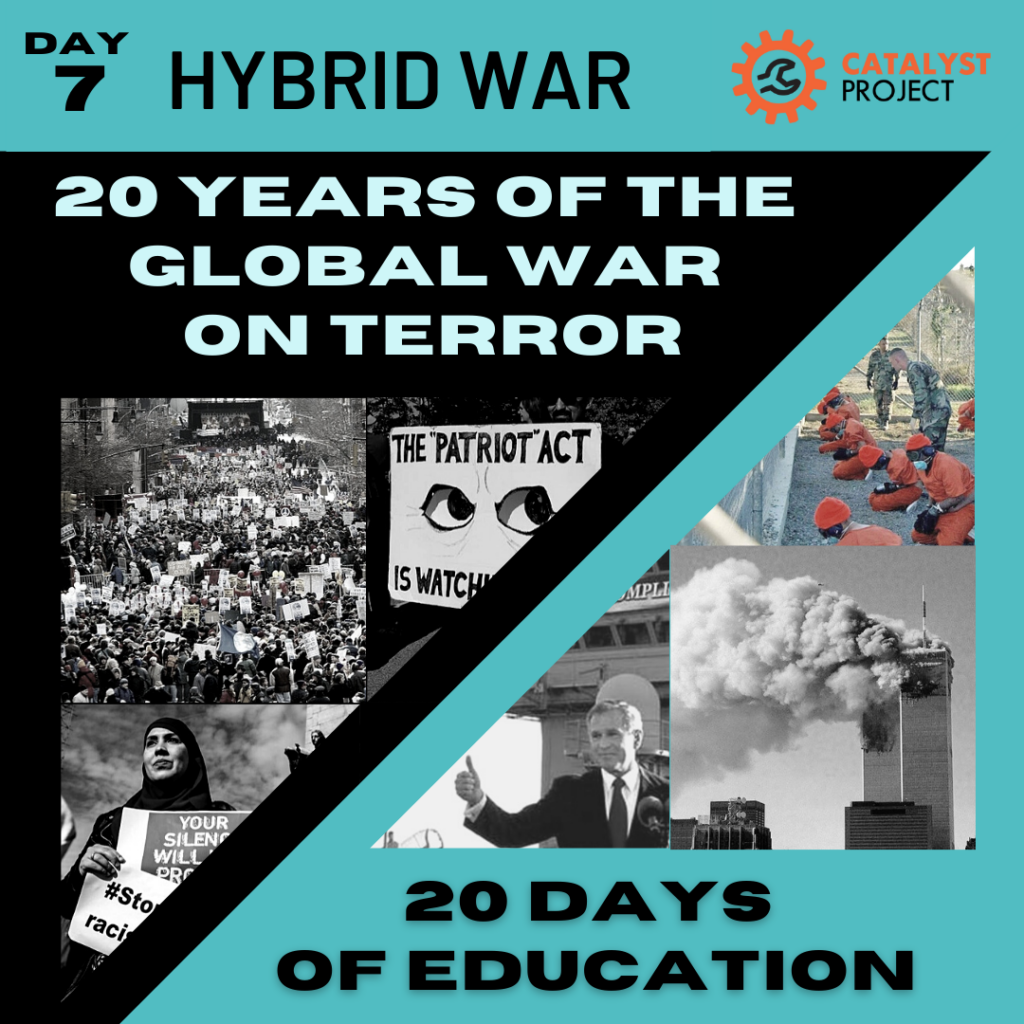
One of the essential elements of the War on Terror is the use of hybrid warfare. This type of warfare blends conventional warfare (boots on the ground, drones) with other methods, such as sanctions, deceptive news, diplomatic power, electoral intervention, and the use of the economic power of institutions such as the International Monetary Fund and the World Bank. These methods allow the U.S. to remain in the background, masking its interventionism as it pursues its goal of regime change in countries opposed to U.S. policies. Far from being a “softer” form of warfare, tactics like sanctions are incredibly violent, causing massive suffering of civilians and costing millions of lives.
What do you think would be different if the majority of people in the U.S. understood more about these wars and their effects at home and abroad?
Primary Resource: Vijay Prashad, “Hybrid Wars and US Imperialism”
Additional Resources:
- Iranians Will Not Forget. The Hybrid War Against Iran.
- Sanctions Against Iran: A Duplicitous “Alternative” to War
- U.S. and Allies Wage “Hybrid War” Against Venezuela
- Coronashock and the Hybrid War against Venezuela
Organizations: The Black Alliance for Peace, Tricontinental: Institute for Social Research, Women Against Sanctions, War and Militarization of Middle East
Day 8: Palestine
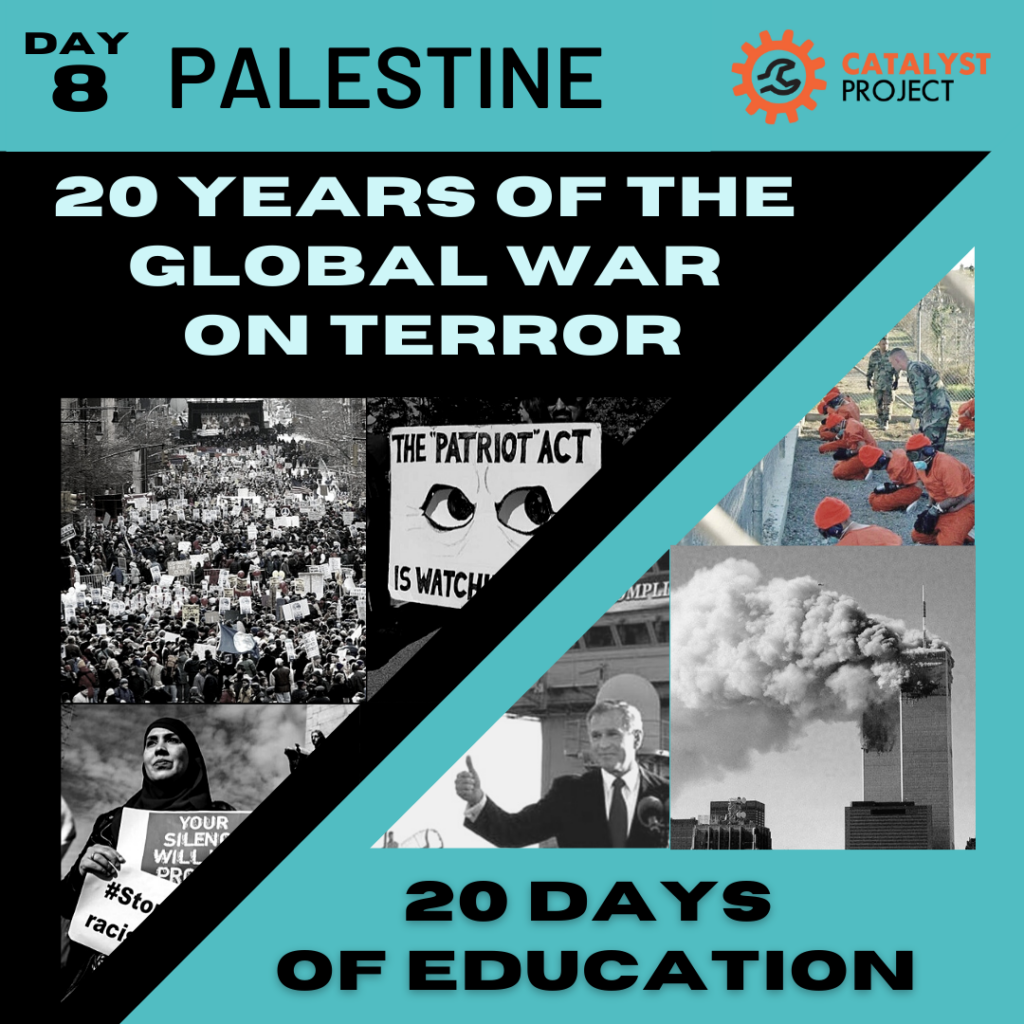
Toufic Haddad writes: “The impact of the US-led “war on terror” on the Palestinian people, their movement, and its leadership has been far-reaching and devastating. The aftermath of the 9/11 attacks provided Israel with ideal political and diplomatic conditions to achieve long-standing goals.”
More from today’s resource: “Israel Took Advantage of 9/11 to Wage War on Palestine” by Toufic Haddad:
“Israel immediately seized upon the 9/11 attacks to do as much damage as possible to the Palestinian national project in terms of its leadership structure, organizations, personnel, and morale. It used the pretext of ongoing “Palestinian terror” — namely the Palestinian uprising — to ramp up the death count of the Second Intifada, in particular by targeting key grassroots leaders who were seen as its most effective organizers. Assassination by hit squads, Apache helicopters, and eventually drones became a central tool used to decimate the experienced ranks of Palestinian political organizations…
“Israel has long acted as a laboratory to research, develop, and test cutting-edge security technologies and doctrines, all funded by the US taxpayer. It was thus uniquely well positioned to take advantage of the financial windfalls that the war on terror released for such projects.
Israel quickly became a global leader in the development of drone warfare capabilities, border detection systems, aggressive “anti-terror” hit-squad doctrines, and elaborate spy and signal intelligence systems. It developed and tested all of these weapons and strategies within the Palestinian arena, the Gaza Strip in particular, where the territory’s near-hermetic sealing gave such technologies the stamp of being “battle-tested.””
Additional Resource: 10 Years Since the Holy Land 5 by Palestinian Youth Movement, daughters of the Holy Land 5, and Coalitions for Civil Freedoms
Organizations: Palestinian Youth Movement, Arab Resource and Organizing Center , US Palestinian Community Network, Adalah Justice Project, US Campaign for Palestinian Rights, Within Our Lifetime – United for Palestine, Palestine Institute for Public Diplomacy, Boycott National Committee, Al Awda: The Palestine Right to Return Coalition, Samidoun: Palestinian Prisoner Solidarity Network
Day 9: Environmental Impacts
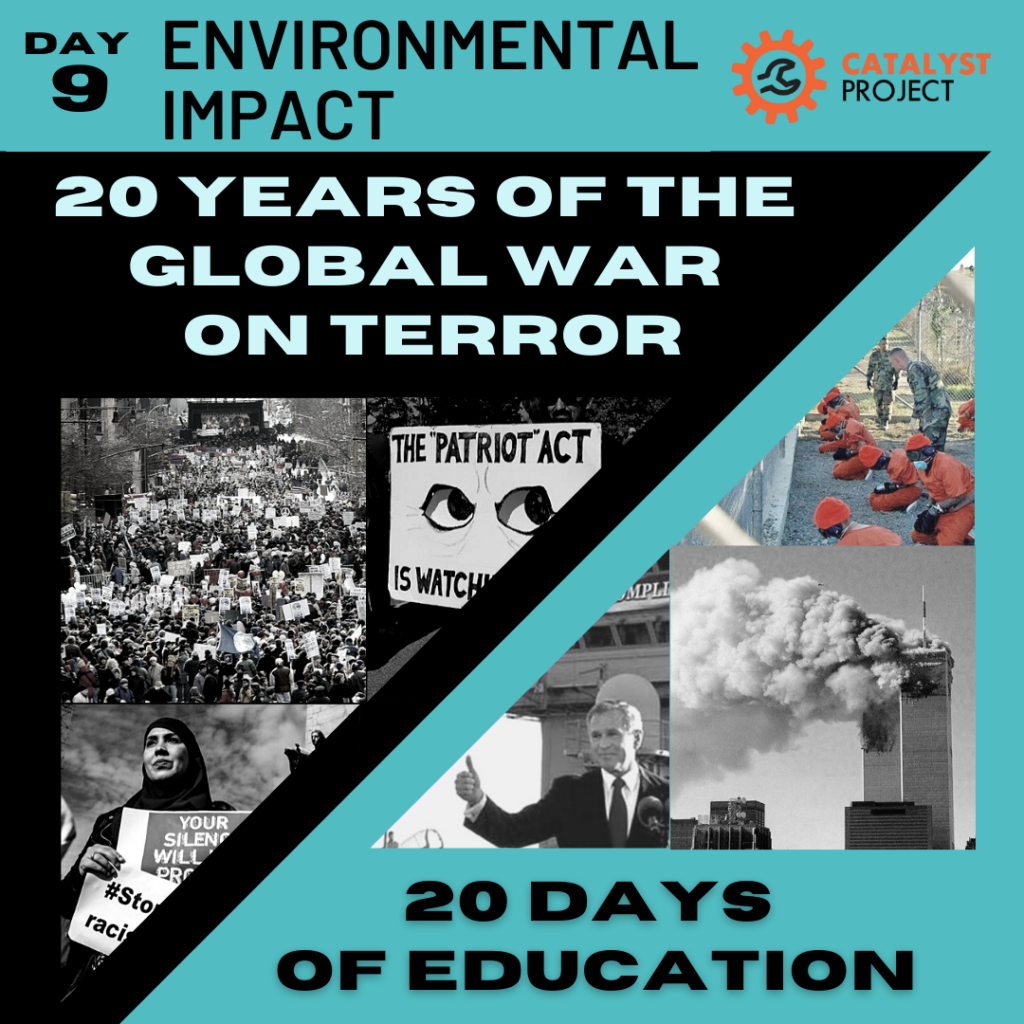
The US military is the single biggest danger to the environment globally. It is the world’s biggest polluter, is inextricably entwined with the fossil fuel industry, and is the primary force used to protect and serve the interests driving devastating extraction worldwide.
The wars in Iraq, Afghanistan and elsewhere have far reaching impacts and consequences on bodies and land. Environmental devastation in Iraq and Afghanistan caused by the US war have resulted in huge rates of birth defects and poisoning of the soil. These effects will last long beyond direct US military occupation. These life-threatening toxics also affect the mostly indigenous, Black, brown, and white working class communities in the US where they are developed, such as Hawai’i and Puerto Rico, or dumped, like the radioactive Hunters Point naval shipyard in San Francisco.
Survivors and veterans are leading the research, advocacy and activism to address the harms done to bodies and land by US military toxins. One example was the Right to Heal campaign, a joint project of the Organization of Women’s Freedom in Iraq with About Face (following the lead of the Vietnam Agent Orange Relief & Responsibility campaign led by Vietnamese activists along with Vietnam Veterans Against the War).
Primary Resource: The Right to Heal: Holding the US Accountable for the Human Costs of War
Additional Resources:
- Iraqi and American Activists in Joint Campaign for Peace
- Video from the Right to Heal Campaign
- War, Climate Change and Women by Maryam Roberts
- Environmental Costs by The Cost of War Project
Organization: OWFI – Organization of Women’s Freedom in Iraq (OWFI)
Day 10: Architects and Enablers
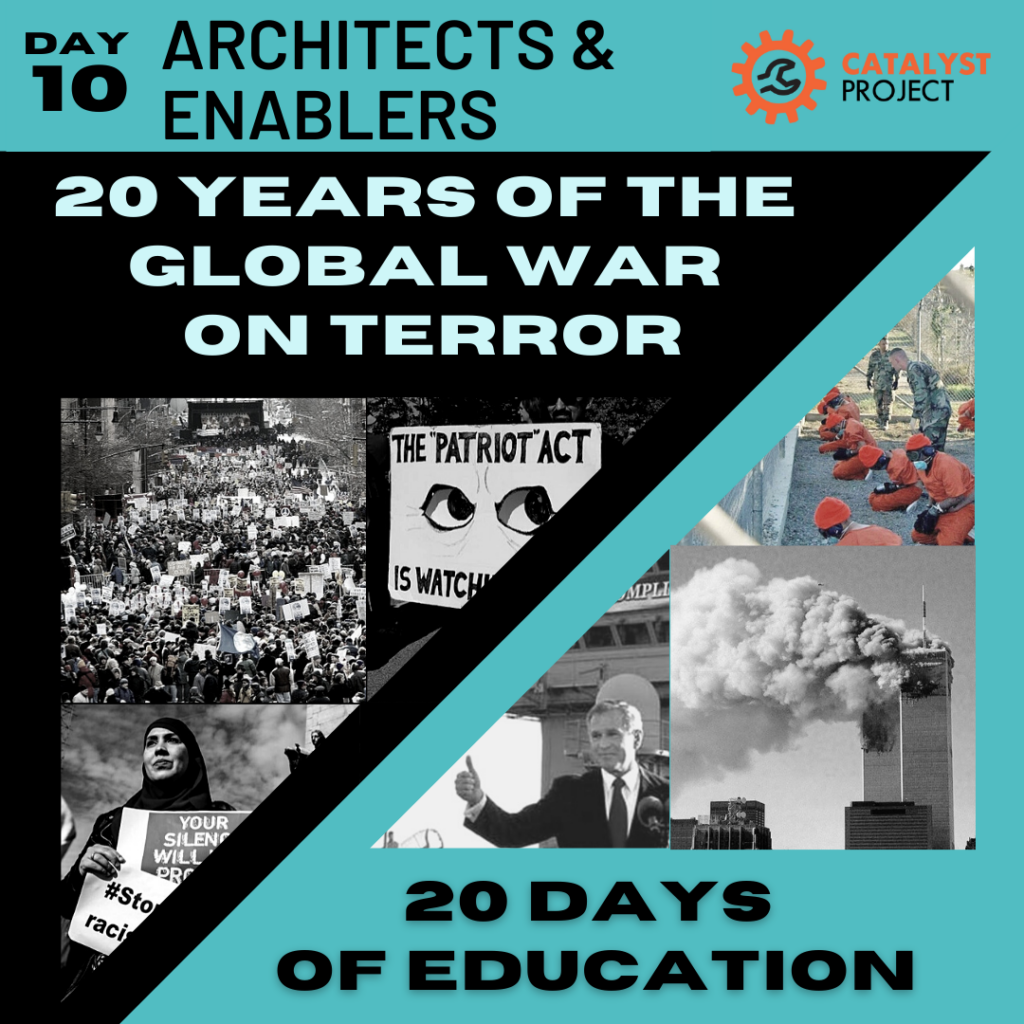
From its inception, the Global War on Terror has been a fundamentally bipartisan effort. Just three days after the 9/11 attacks, Congress voted into law the Authorization for Use of Military Force, legislation which granted the Bush administration and its successors authority to use all “necessary and appropriate force” against anyone determined to have “planned, authorized, aided, or committed” the attacks. Senator Barbara Lee of Oakland (@repbarbaralee)
was the sole legislator from either party to vote against the bill, a decision that earned her numerous death threats. The Bush administration used the authority granted by the AUMF to launch its invasion of Afghanistan and later Iraq and, ever since, U.S. presidents from both parties have interpreted the AUMF broadly to expand and intensify its deadly global wars. Despite multiple clear violations of international law, there has been no accountability for the atrocities carried out by Bush, his cabinet, or the Obama and Trump administrations that followed in his footsteps.
What do you think would be possible if people in this country knew more about the people responsible for launching and perpetuating the Global War on Terror? What could accountability look like?
Primary Resource: Intercepted podcast: No Accountability for War on Terror Atrocities
Additional Resources:
- War Criminals and 9/11: How We Achieve Accountability by Azadeh Shahshahani from Project South
- Afghanistan debacle shows the political bankruptcy of US liberalism by Omar Zahzah
- Interview with Noam Chomsky in Truthout: The U.S.-Led “War on Terror” Has Devastated Much of the World
Organization: Project South
Day 11: War Profiteers
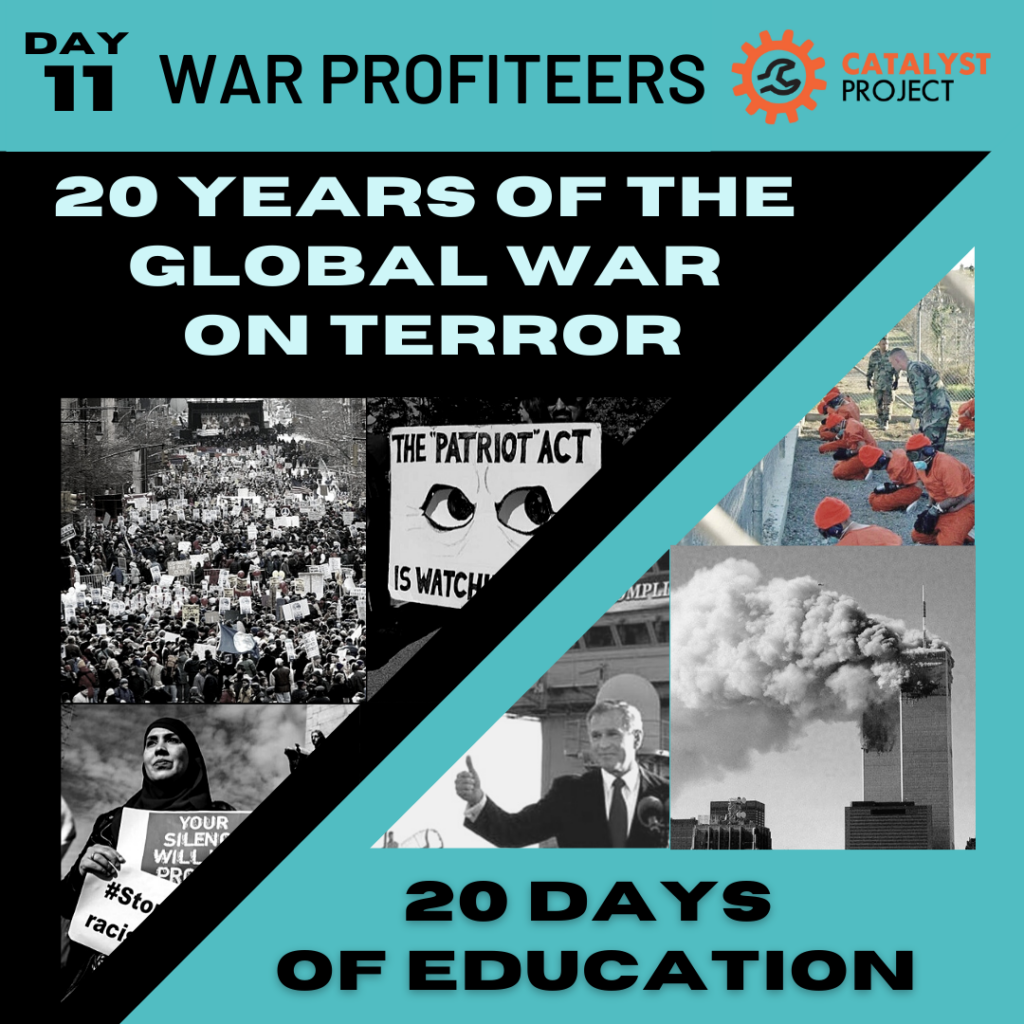
Over the past two decades of war, multiple major economic crises incited by neoliberal policies have deepened inequality within the U.S. and globally, while the war industries have expanded their power and sustained record profits. Working in direct collusion with the corporate purveyors of the tools of aggression and surveillance, politicians across four administrations have justified the expansion of war and the security state in the name of counterterrorism. Often referred to as the military-industrial complex, this vast and growing network of arms manufacturers, security firms, tech companies, lobbyists, consultants, and think tanks function as a privatized arm of the state, driven by self-interest to perpetuate and expand war while transferring trillions of public dollars into private hands. This partnership is so entrenched that there is a well-known “revolving door” in Washington between the state and its private counterparts, with outgoing officials assuming high-paying positions in the private sector and industry executives earning government appointments that allow them to shape policy and public institutions in their favor. While the emergence of the military-industrial complex precedes 9/11 and the Global War on Terror, its power and influence has unquestionably deepened over the past twenty years, a period during which U.S.-led war has spelled misery and death for millions, destabilized multiple countries, accelerated climate breakdown, weakened human and civil rights, and further eroded the public safety net.
Today, we share Big Tech Sells War, a resource from Crescendo, a joint project of Action Center on Race and the Economy, Little Sis, and MPower Change. The project tracks the war profiteering role of the tech sector and illustrates how the Global War on Terror has created Big Tech as we know it. Check out the Revolving Door Yearbook, the Contracts Calculator, and multiple in-depth timelines.
Additional Resources:
- The Shock Doctrine, Homeland Security: Homeland Security: An Excerpt from The Shock Doctrine | Naomi Klein
- Big money behind war: the military-industrial complex
- Progressive critics say investors and weapon makers only clear winners:
- Progressive Critics Say Investors in US Weapon-Makers Only Clear Winners of Afghan War
A graphic on profits https://www.instagram.com/p/CTNmwEsNPIK/
Day 12: Counter Recruitment and GI Resistance
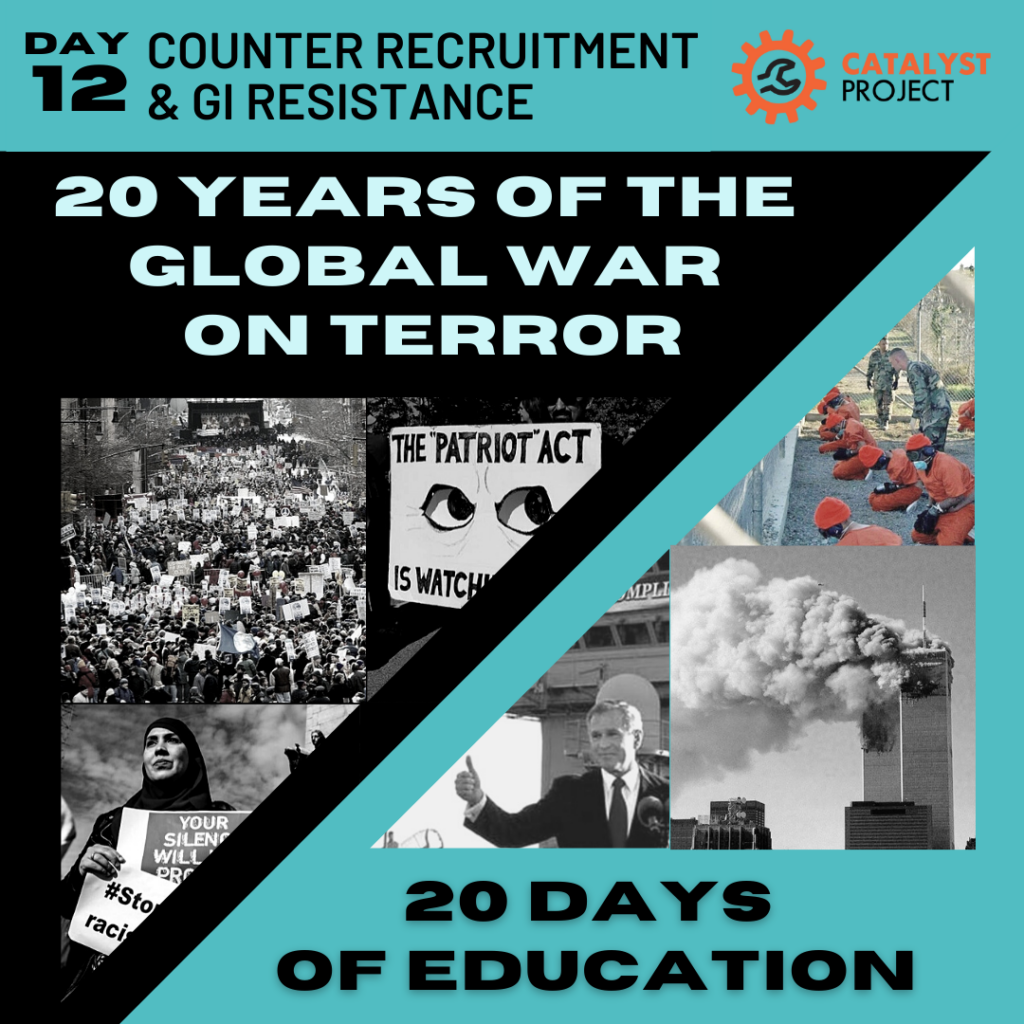
As the wars dragged on, the enormous street mobilizations of the early 2000s gave way to lower profile, long-haul community organizing. Two primary strategies, counter recruitment and GI resistance, intended to dry up the stream of disposable labor the Pentagon relied on to carry out their wars.
After the Vietnam War, the Pentagon made an intentional shift to the poverty draft. Bush’s 2002 No Child Left Behind Act forced schools to give children’s info to military recruiters or lose Federal funding, which helped fuel the resurgence of counter-recruitment work.
An estimated 10,000 soldiers deserted in just the first four years of the Iraq War. Countless others refused orders and found hundreds of ways to resist their role in the destruction. With mentorship from Vietnam and Gulf War era antiwar veteran activists, working alongside non-veteran activists in the US and eventually alongside Iraqi and Afghan grassroots organizations, About Face: Veterans Against the War (at the time called Iraq Veterans Against the War) formed in 2004 and became the backbone of antiwar veterans and active duty service members who challenged or opposed the wars. Antiwar veterans counseled active duty resisters and conscientious objectors, organized and spoke out everywhere from inside schools to outside a NATO summit, to the 2008 Winter Soldier: Iraq and Afghanistan hearings in D.C.
Primary Resource: testimony from the Winter Soldier hearings
Additional Resources:
- Drop the MIC Poetry Video Montage by Ericson Amaya, Alejandro Manzanarez & Leilani Rose from Bay Peace
- Kelly Dougherty from Legacy of GI Resistance Panel
- Demilitarization as Rehumanization by Clare Bayard (from 2011)
Organizations: About Face: Veterans Against the War , Dissenters , The National Network Opposing the Militarization of Youth
Day 13: Normalizing Torture
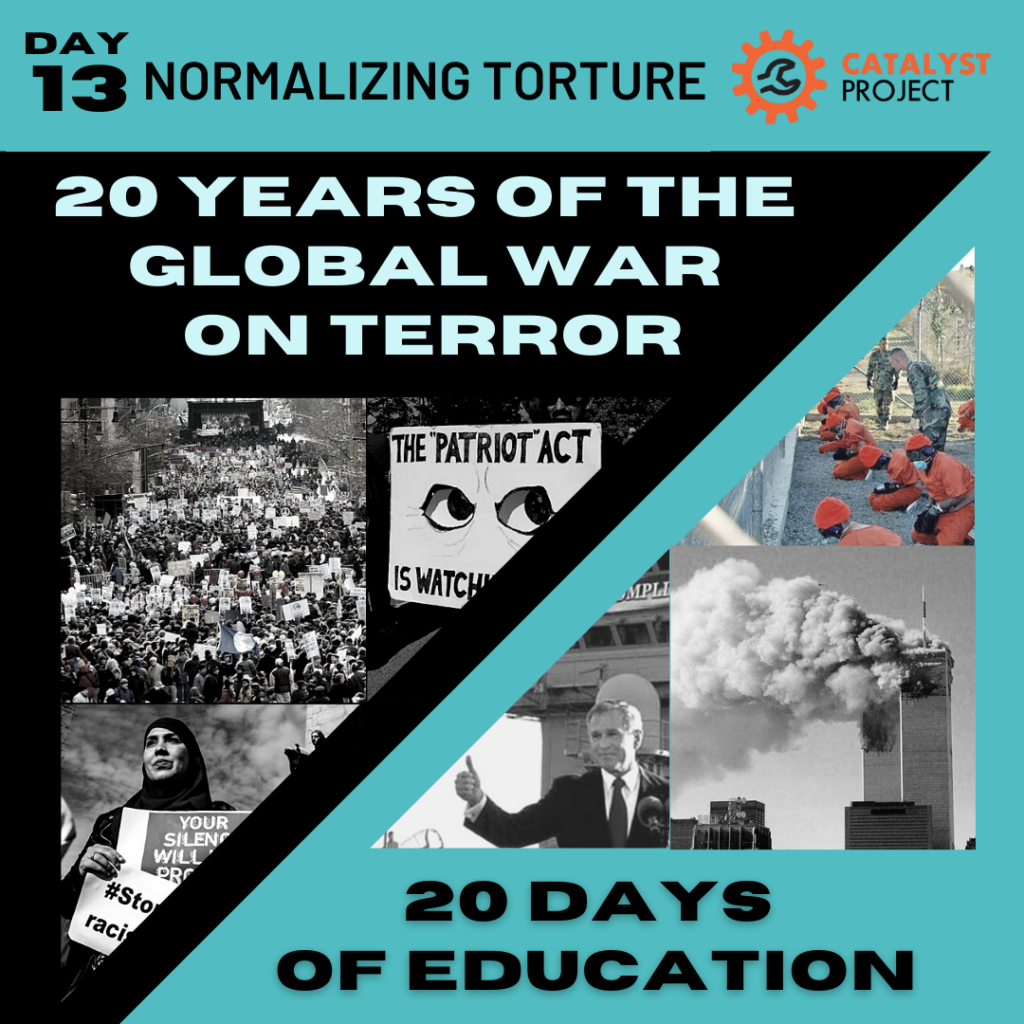
Immediately after his first public address on September 11, 2001, President George W. Bush gave his White House staff expansive secret orders for the use of harsh interrogation, saying “I don’t care what the international lawyers say, we are going to kick some ass.” A few months later, Justice Department Attorney John Yoo drafted the notorious “torture memos” that gave the CIA license to use torture to interrogate detainees as part of the War on Terror. The memo advised that if an “enhanced interrogation” method stopped short of “death, organ failure, or serious impairment of bodily functions,” it did not constitute torture—in clear violation of international laws against the use of torture. This memo was used to legitimize such widely-used techniques as near-drowning (“waterboarding”), stress positions, sleep deprivation, and forced nudity, force feeding among others – all designed to break down detainees mentally as well as physically.
The notorious detention facility at the U.S. military base in Guantánamo Bay, Cuba, is a site of torture and human rights abuses. There are stillnearly 40 men held in indefinite detention there, survivors of nearly two decades of torture, and most have never been charged with any crime. In 2003, the U.S. commander for Iraq issued orders for the use of torture at the infamous Abu Ghraib prison, torture that was carried out both by U.S. military personnel and private contractors.
President Bush and Defense Secretary Donald Rumsfield’s authorization of the use of torture led to international demands that they be tried for war crimes, crimes for which they were never held accountable. Bush continues to enjoy his status as an elder statesman, wrote his memoir, and has taken up painting. John Yoo holds an endowed chair at the University of California, Berkeley, School of Law.
Question: What became normal and acceptable after 9/11 that had previously been viewed as criminal? What effect do you think the legal justification for torture had on U.S. culture more broadly?
Primary Resource: Ex Abu Ghraib Prisoner Speaks Out On Abuse [In this short video, a survivor of the U.S. torture program describes his experience and its enduring impact. It is difficult to watch but we believe it is important for people to bear witness to his story.]
Additional Resources:
- Gitmo is Killing Me by Samir Naji and Hasan Moqbel
- On the 20th Anniversary of the 9/11 Attacks, the US Needs to Close Guantánamo and Bring to an End the Broken Military Commission Trials – Articles – Welcome to
- 09/21/2014 “Mainstreaming Torture”, by Dr. Rebecca Gordon
- Normalizing Torture on ’24’
Organizations: MPower Change, Justice for Muslims Collective, Amnesty International, The Center for Constitutional Rights (CCR), Close Guantanamo, the National Religious Campaign Against Torture, and Witness Against Torture
Day 14: Surveillance State
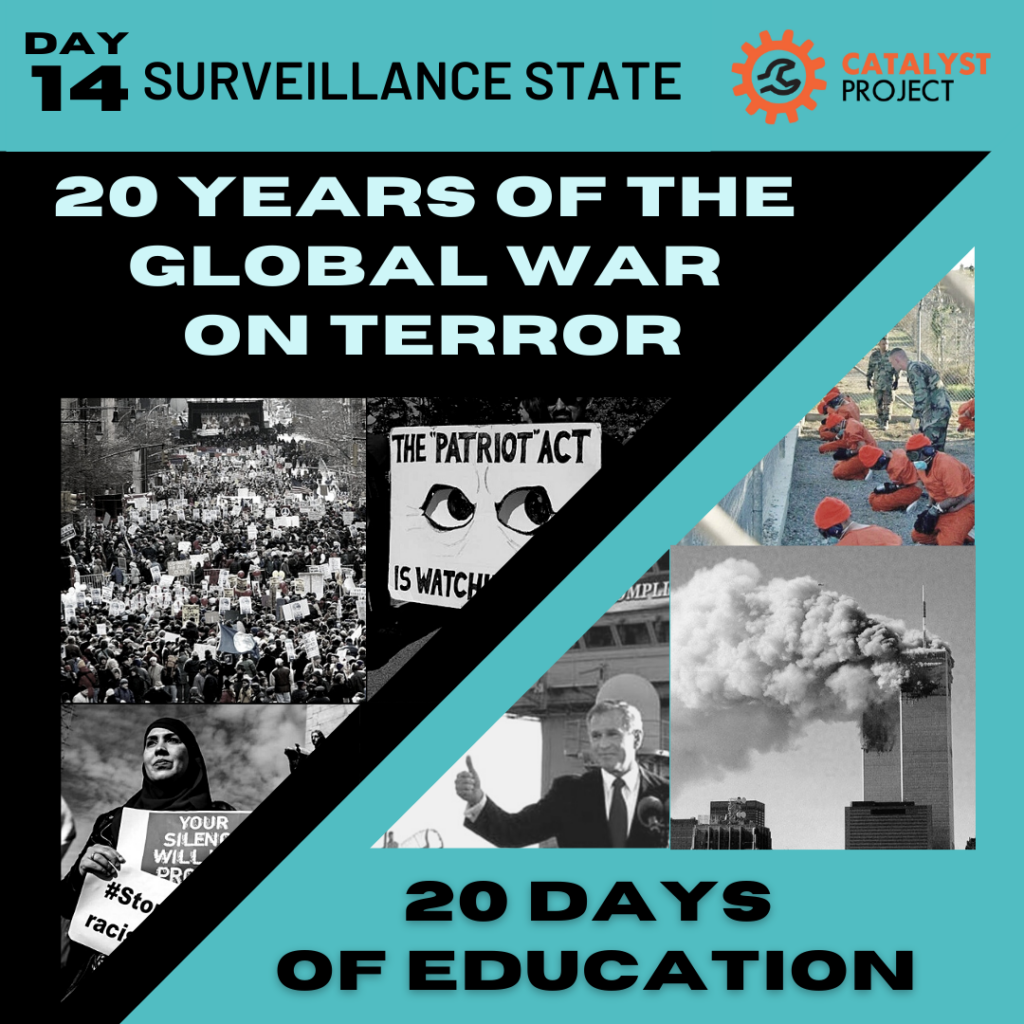
By the evening of 9/11 itself, the Pentagon began formulating a plan for mass surveillance with the Orwellian title “Total Information Awareness – TIA.” TIA has had several iterations over the years, but the goal has never changed: achieving the “golden age of surveillance” long sought by the surveillance agencies whose ideas had been rejected by Congress as too intrusive. Six weeks after the attacks, Congress passed the USA Patriot Act, an unprecedented overhaul of laws that vastly expanded the government’s ability to conduct surveillance with invasive spying and secret searches—all without having to prove probable cause and with little or no oversight by the courts.
The Bush administration greatly expanded executive powers to create a global program of mass surveillance that operates to this day. The National Security Agency (NSA), with the cooperation of major telecommunications companies, maintains a massive database of phone records, emails, texts, passwords, social media posts, business records, even library and medical records. The scale of surveillance is staggering; we learned through Edward Snowden’s revelations that the NSA stores communications of over a billion people worldwide, including United States citizens, and tracks hundreds of millions of people’s movements using cell phone metadata. Many forms of public surveillance have become normalized: airport screenings, metal detectors in public buildings, CCTV.
Muslim communities have been subjected to some of the most intense surveillance of the U.S. security state. From biased security searches at airports to the use of confidential informants spying on Muslim-Americans in their places of worship, Islamophobia has been an underpinning of this pervasive surveillance. Other groups who are also regarded as inherently dangerous— immigrants, Black and Brown and Indigenous activists and other political dissenters— have also been targets of the surveillance state. There has been resistance to the U.S. surveillance state, including community activism to protect those most targeted, investigating and exposing these abusive programs, and legal action to challenge these abusive, racist practices.
What is the cost to us as a society to live in a national security state?
Primary Resource: South Asian American Progressive Organizing in the Bay Area
Additional Resources:
- Podcast: ASATA’s radio show on 9/11/21
- Panic made us vulnerable’: how 9/11 made the US surveillance state – and the Americans who fought back
- Spying on the Margins: The History, Law, and Practice of US Surveillance Against Muslim, Black, and Immigrant Communities
- The FBI and Its Fictional “Black Identity Extremism” Movement
Organizations: The Alliance of South Asians Taking Action (ASATA), Project South, Stop LAPD Spying, and Electronic Frontier Foundation
Day 15: Immigration
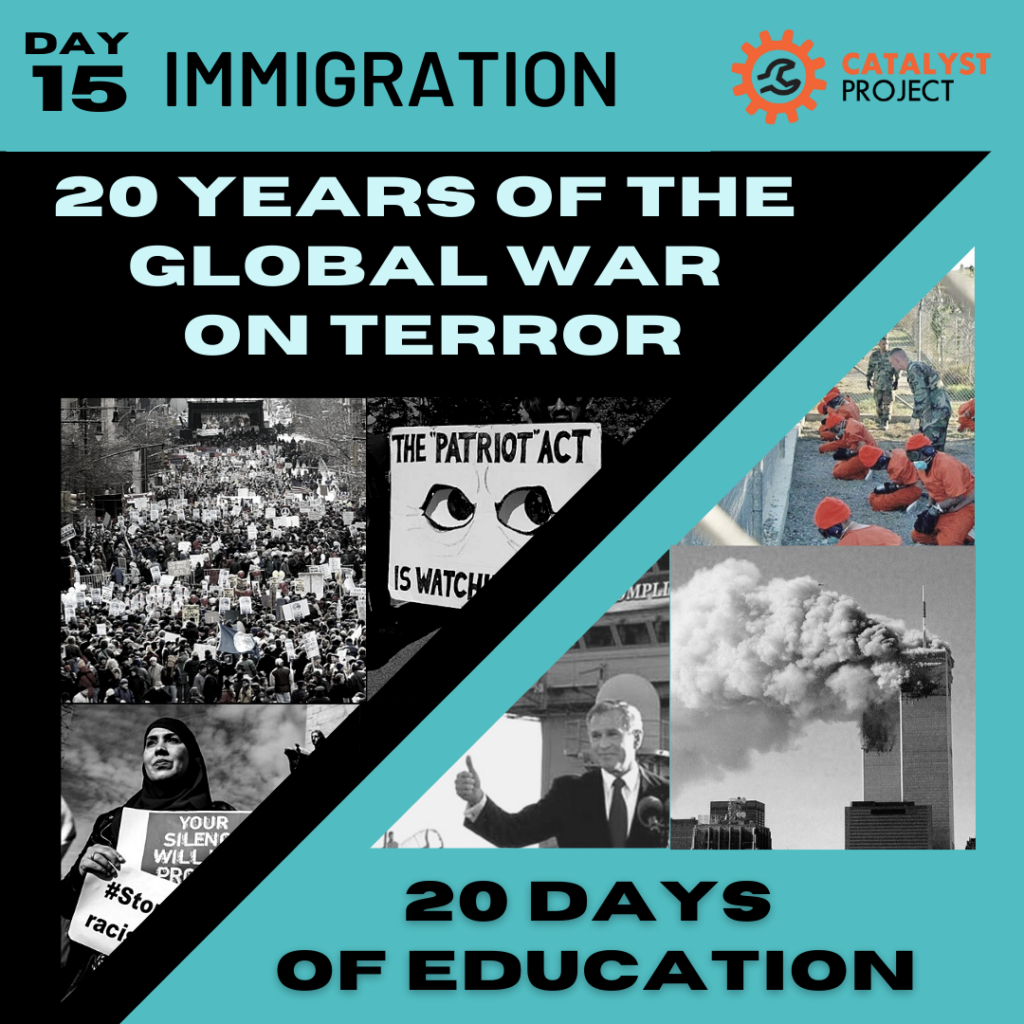
The wave of anti-Muslim hysteria that enveloped the U.S. after 9/11 provided the country’s ascendant anti-immigrant movement the mass political support needed to deepen its influence in U.S. politics and enact its white supremacist vision as policy. Following the attacks, the Bush administration was swift to impose drastic limitations on immigration to the U.S., particularly from majority-Muslim countries, while expanding police power as immigration enforcers and consolidating and expanding the country’s already sprawling enforcement apparatus under the newly formed Department of Homeland Security. Immigration and Customs Enforcement, known popularly as ICE and described by many immigrant rights organizations as a rogue agency guilty of rampant human rights abuses, was also formed in the aftermath of the attacks.
Twenty years later, a series of manufactured crises along the U.S.-Mexico border are a prominent and permanent feature of U.S. politics. While they may be distinguishable in rhetoric, all three of Bush’s successors have built on his legacy, from Obama as the “deporter-in-chief” who promised to deport “felons not families,” to Trump’s Muslim Ban and family separations, to Biden repopulating immigation jails emptied during the pandemic and enacting mass expulsions of Black Haitian immigrants seeking asylum in recent weeks.
This has also been a period of fierce resistance and immigrant-led movement building, with undocumented youth playing a central role, refusing to live in the shadows and demanding a universal path to citizenship. This leadership has been critical to creating programs like DACA, while demanding bolder programs and policies, and has also shifted national dialogue about immigration away from criminalization and false narratives of “good” and “bad” immigrants. As Biden goes back on his campaign promises to immigrant communities who helped to elect him, organizers are scaling up their efforts and calls are growing for the abolition of so-called “immigration detention.”
Today we share “21st Century White Nationalism: 9/11 and the Anti-Immigrant Movement,” a piece from Political Research Associates that explores this history in more depth. Make sure to also check out our additional resources, including an incredible interview with Alex Aviña on the Red Nation Podcast that discusses the War on Terror and border militarization in the context of Indigenous genocide, frontier expansion, and anti-communism.
Primary Resource: 21st Century White Nationalism by Political Research Associates
Additional Resources:
- Red Nation podcast: U.S. Frontiers as Forever Wars w/ Alex Aviña
- Number of Immigrants Detained by ICE Has Increased 70 Percent Under Biden
- Four Months Ago, Biden Said Haiti Wasn’t Safe. Now He’s Deporting Thousands There.
- How 9/11 stalled immigration reform — and inspired a new generation of activists
Organizations: Detention Watch Network, Mijente, Immigrant Defense Project, Black Alliance for Just Immigration, and United We Dream
Day 16: The Rise of the Far Right
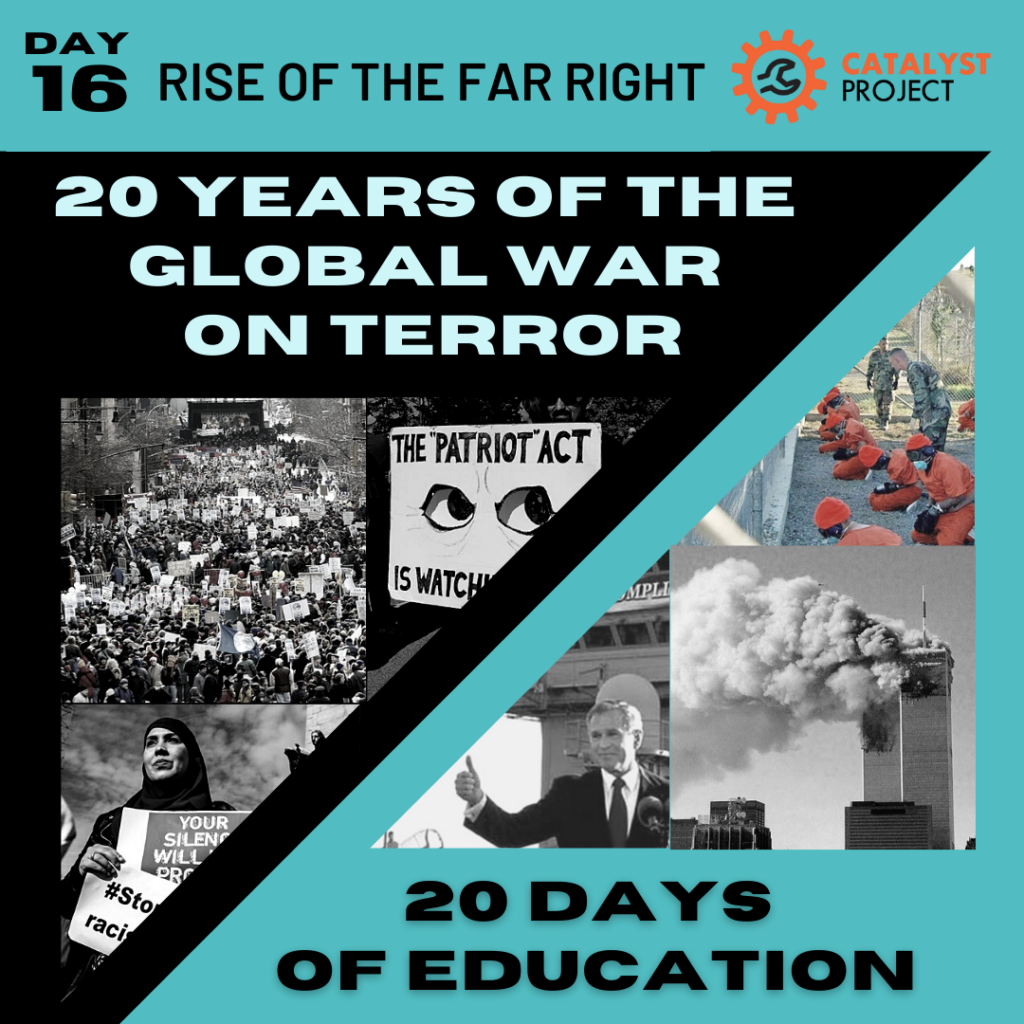
The politics of the post-9/11 era have proven fertile ground for the most extreme elements of the far right, who have seized on the racialized figure of “the terrorist” to advance and mainstream its white supremacist agenda. While the war itself was so broadly conceived that anyone anywhere could be determined a terrorist or a threat to national security, the organized violence of white supremacist groups has been predictably excluded from the state’s counterterrorism agenda, in keeping with the long history of state alignment with white supremacist forces in this country. The era has also produced a more heavily policed and militarized society, drastically expanding the traditional recruitment grounds for the right, whose racist narrative of “white replacement” has been bolstered by the proliferation of anti-Muslim and anti-immigrant ideology during this period. While the roots of Trump’s ascendency run far deeper in U.S. history, it is hard to imagine his takeover of the Republican Party, or the Tea Party’s emergence before him, outside of the context of the Global War on Terror and its racist backlash.
In the face of deepening inequality and rising far right vigilante and state violence against communities of color, the past two decades have also seen a resurgence of left organizing and, most recently, a widespread reckoning with racial injustice in the U.S. From Occupy to Black Lives Matter to Indigenous-led land and water defense, left social movements are expanding their base to advance alternatives to white nationalism and fascism.
Primary Resource: Political Research Associates: What if 9/11 Had Never Taken Place?
Additional Resources:
- Racist Rage: Islamophobia, the Tea Party, and Endless War by Rami El-Amine
- Don’t Expand the War on Terror in the Name of Antiracism by Arun Kundani and Jeanne Theoharis
- Islamophobia after 9/11: How a fear mongering fringe movement exploited the terror attacks to gain political power by Booth Gunter and Caleb Kieffer
- Spencer Ackerman on How the U.S. War on Terror Fueled and Excused Right-Wing Extremism at Home
Organization: Political Research Associates
Day 17: Policing After 9/11 and “Countering Violence Extremism” (CVE)
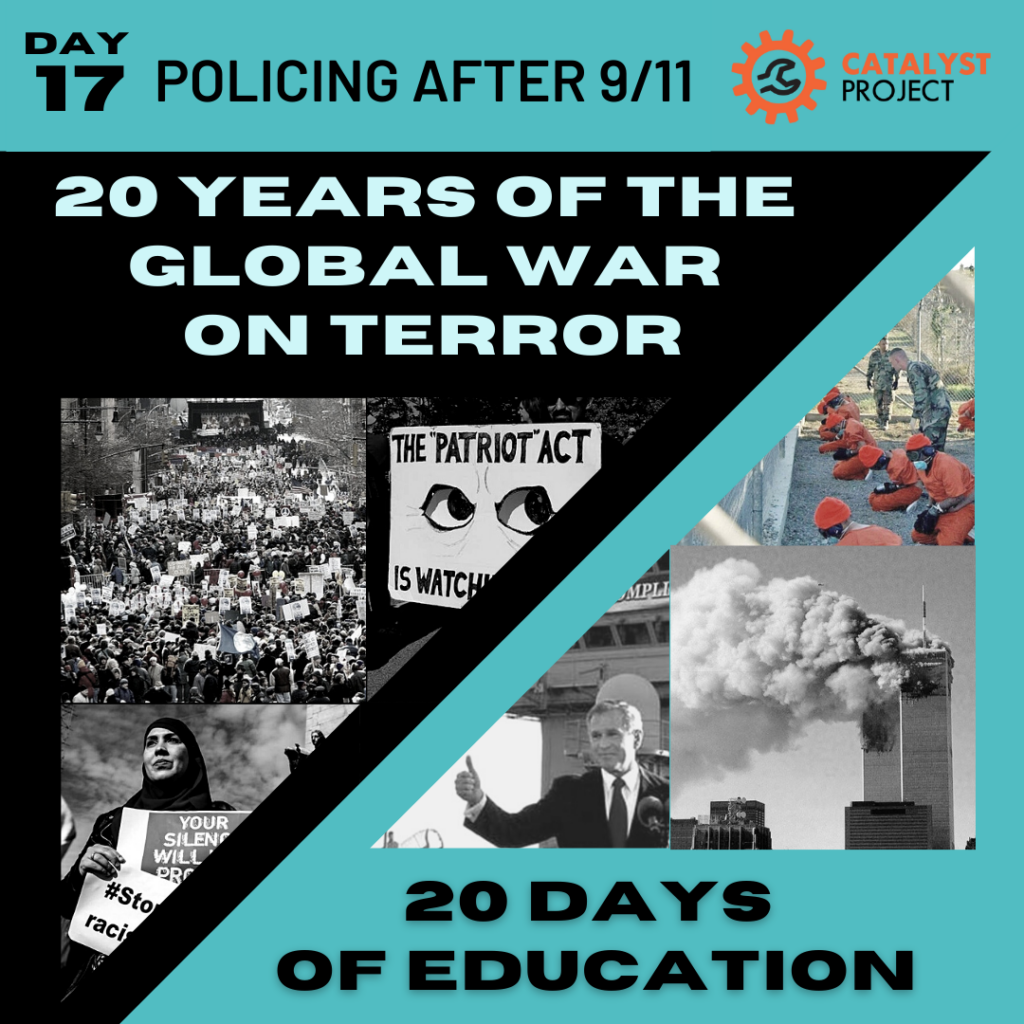
The War on Terror isn’t operating only outside of the borders of the US, it has its domestic counterpart in policing, imprisonment, and surveillance targeting Muslims and Black and Brown people in the US. Countering Violent Extremism (CVE) programs, run by the Department of Homeland Security, are purportedly intended to identify people, especially youth, who might be “vulnerable to radicalization.” These programs recruit trusted members of the Muslim community—teachers, mental health providers, and social workers—to evaluate young people’s potential for terrorism and report them to DHS, using indicators such as frequent mosque attendance, expressing frustration with U.S. politics, or voicing feelings of religious discrimination.
CVE programs are deeply Islamophobic, based on a view of Muslim communites as inherently violent and a threat to the U.S. Besides the racist underpinnings and flawed pseudoscience CVEs are based on, groups like the Muslim Justice League oppose them because they:
- “Foment suspicion and fragment Muslim communities into ‘Good Muslims’ and ‘Bad Muslims,’
- Interfere with marginalized communities’ access to health care and education, by worsening bullying of Muslim students and eroding confidentiality in health services,
- Endanger rights that are essential in free societies — including rights of association and rights to share and receive information, to express dissent, to worship as one chooses, to pursue an education, and to seek and receive health care, and
- May undermine attempts to hold states accountable for human rights abuses.”
CVE programs have consistently been challenged by Muslim community groups across the country, such as the successful grassroots campaign in Los Angeles that forced the city to reject a CVE grant from the DHS in 2018.
The FBI has a long history of infiltrating domestic BIPOC organizations and using informers to sow discord in an effort to destroy left organizations from within. They have historically targeted Black activists, from the infamous COINTELPRO era of the 60s, in which the Black movement was deemed to be “the greatest threat to the internal security of the U.S.” to the 2017 creation of a category of “Black Identity Extremists.” An FBI report alleging the existence of “a terrorist movement driven by perceptions of police brutality against African Americans” was used to justify the intense surveillance.
Primary Resource: Resisting Surveillance webinar: Fatema Ahmad on CVE
Additional Resources:
- What is “Countering Violent Extremism” (CVE)? – Muslim Justice League
- #StopCVE Now
- The ex-FBI informant with a change of heart: ‘There is no real hunt. It’s fixed’
- Khury Petersen-Smith explains how US wars abroad are intimately tied to police brutality at home, for Yes! Magazine.
- Spying on the Margins: The History, Law, and Practice of US Surveillance Against Muslim, Black, and Immigrant Communities
Organizations: Muslim Justice League, MPower Change, Project South: We All Count, We Will Not be Erased – Institute for the Elimination of Poverty and Genocide
Day 18: Queer & Feminist Struggles Co-opted by Empire
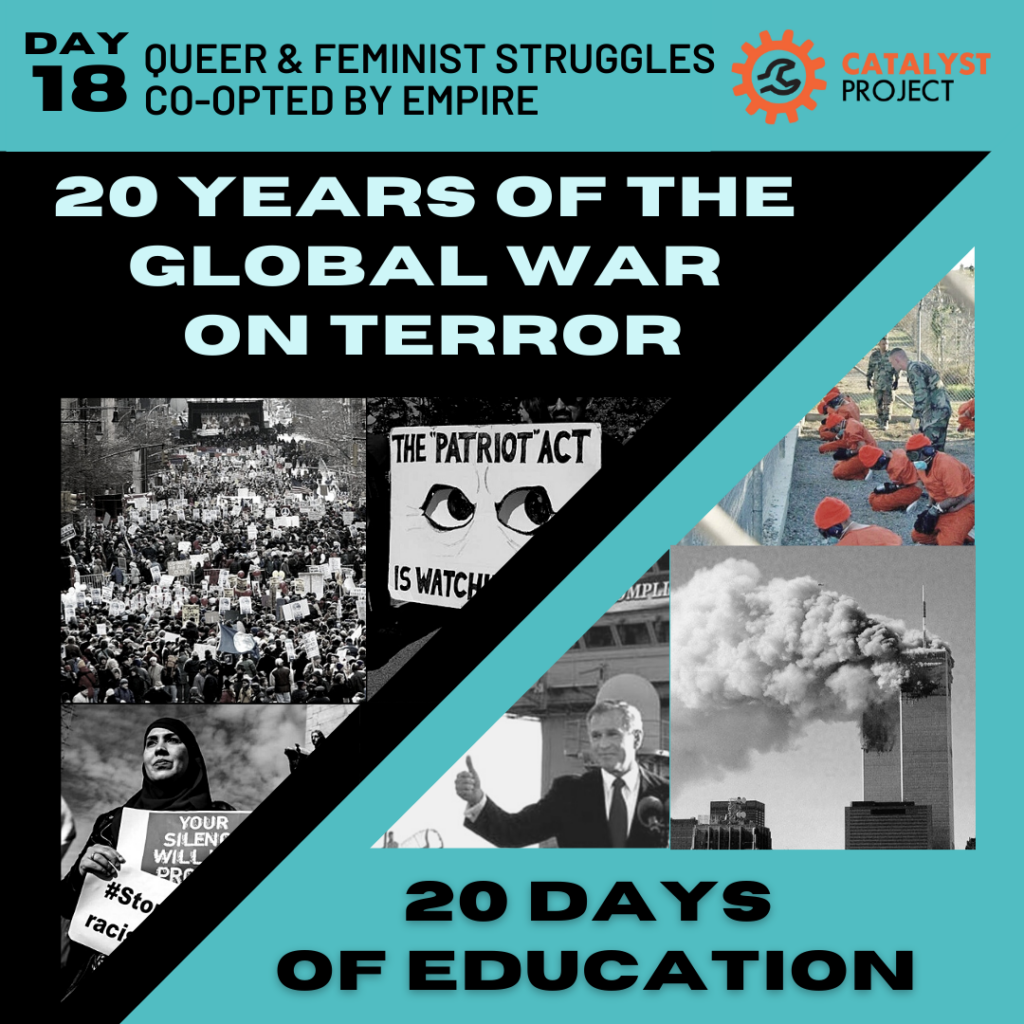
As it launched the Global War on Terror, the Bush Administration sought every recourse to justify its actions to the public and position itself as a liberator of oppressed people living under terrorist rule. This included the broad co-optation of the language and struggles of progressive movements for the rights of women, queer, and trans people to cast Muslims, and people perceived to be Muslims, as somehow inherently homophobic, misogynist, and sexist.
Irrespective of the deep, intersecting misogyny, transphobia, and queerphobia that permeates US life and culture, the US and its allies asserted themselves through this framing as the rightful arbiters of human rights, gender, and sexual equality. The US war in Afghanistan, for example, has been cynically framed as a war to free women from a barbaric culture while invisibilizing its horrific impacts on Afghan women who have suffered greatly under war and occupation, including intensified sexual assault. The same racist logic has been applied domestically, such as when then-candidate Donald Trump renewed his call for a Muslim immigration ban in the wake of the 2016 Pulse Nightclub tragedy in Orlando perpetrated by a Muslim man.
While radical feminist and queer organizers continue to assert anti-imperalist and anti-racist politics as central to liberation, identification with empire has undermined movement building in the U.S., where access to participation in the military and other conservative institutions has been increasingly viewed as a barometer for LGBTQ and women’s “progress.”
What would be possible if our movements for gender, queer, and trans liberation were explictly and unequivocally anti-militarist and anti-imperialist?
Primary Resource: References to the “Texas Taliban” Are Racist and Colonial. Here’s Why.
Additional Resources:
- Was Afghanistan the First “Feminist War”? Examining the Role of “White Feminism” in the Longest U.S. War
- 9/11 and the War on Terror: A Queer Afghan Reflects by Neda Said
- Dean Spade: Meet The Trans Scholar Fighting Against The Campaign For Out Trans Military Service
- Gays of Our Lives by Michael Bronski
Organizations: Queers Against Israeli Pinkwashing, Revolutionary Association of the Women of Afghanistan
Day 19: Women of Color Leadership Globally
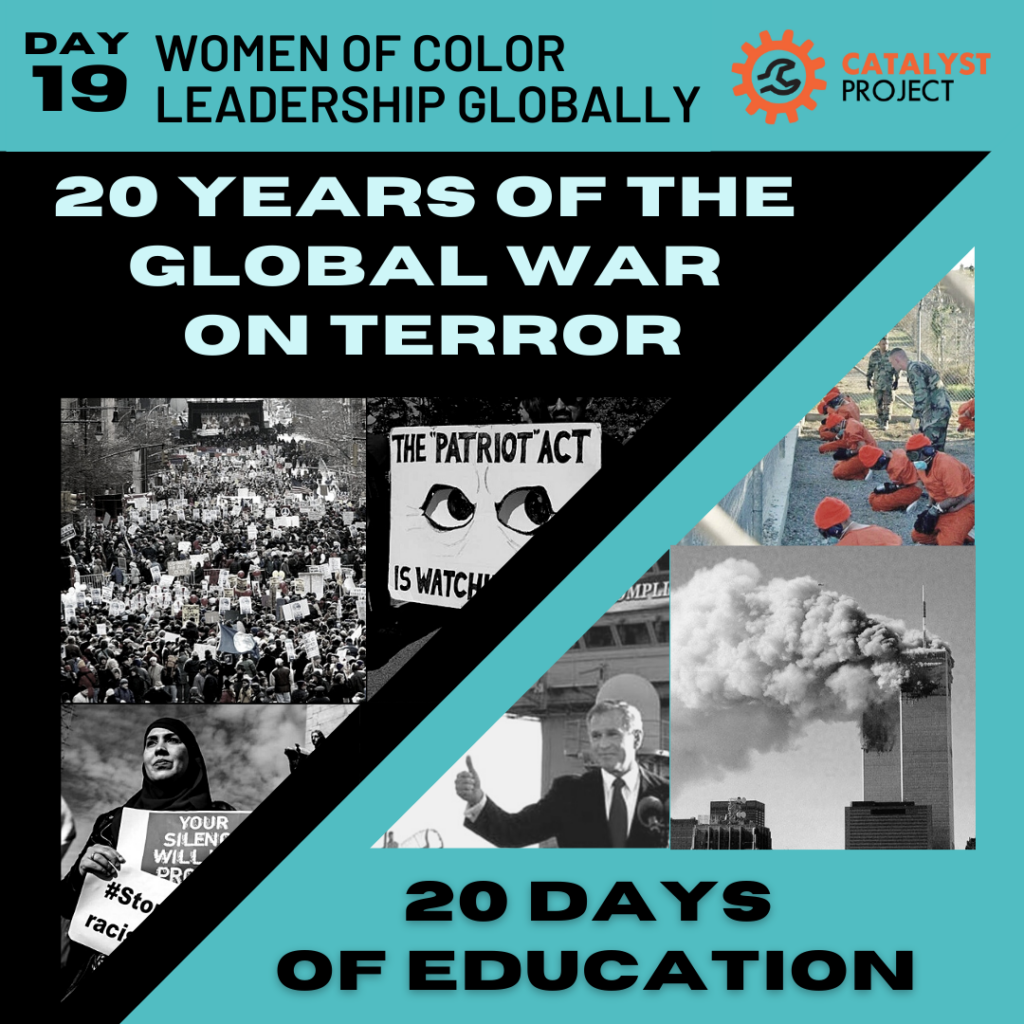
Women of Color feminism underscores the ways gender politics are fundamental to struggles against colonialism, militarism and white supremacy. Globally and inside the US, Women of Color have led resistance to the Global War on Terror. Arab and Muslim feminists have been at the forefront of this organizing, offering justice-centered anti-militarist frameworks to advance a liberatory agenda. Arab and Muslim women in particular have challenged the racist tropes that see their culture as backward and their women as in need of saving by Western civilization – a critical intervention in the post 9/11 era.
Within an antiwar movement that often struggled to connect the dots between state violence against communities of color at home with imperial war making abroad, the leadership of women, trans and gender variant people from communities who deeply understand racialized violence was indispensable.
INCITE! Women of Color Against Violence, in particular, put forward powerful internationalist and feminist interventions with racial justice at the center. Today’s primary resource is their “Anti Militarism Resources” developed after 9/11 and during the invasions of Afghanistan and Iraq.
Additional Resources:
- Afghan Feminists Told Us War Wouldn’t Free Them by Sonali Kolhatkar
- The Other Afghan Women by Anand Gopal
- Reflections in a Time of War: A Letter to My Sisters by Dena Al-Adeeb in Color of Violence
Day 20: Ending the Global War on Terror
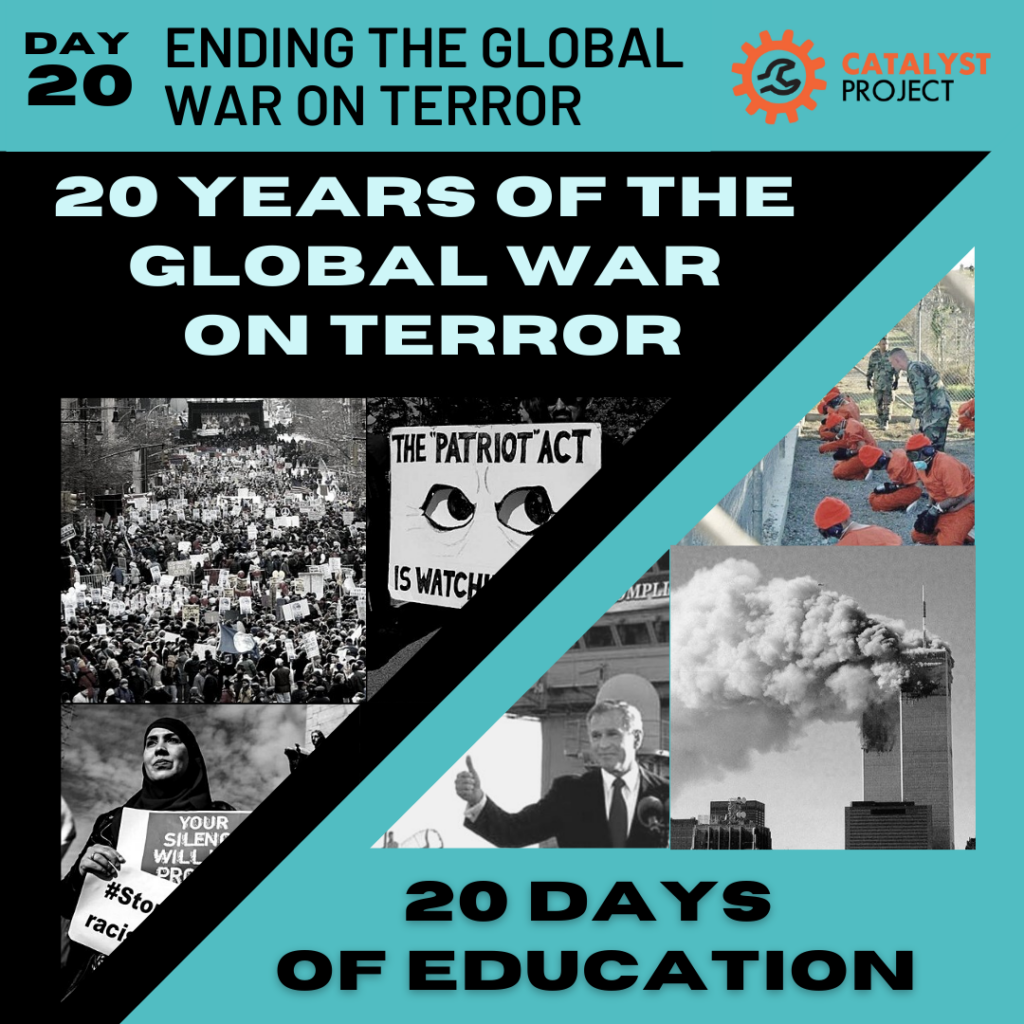
To unravel the Global War on Terror, we need transnational solidarity. We need to foster working relationships so we can learn, repair, and build the possibilities for diplomacy and cooperative governance instead of militarized aggression.
Ending the GWOT means unmaking its structures – that’s everything from troop withdrawal to demilitarizing immigration, from dismantling the surveillance apparatus and the network of US bases around the world- but we can’t actually undo what the GWOT built without challenging the deeper foundations. It is time for us to critically examine the militarized society we live in, and commit ourselves to undoing the military industrial carceral complex.
We look to the vital leadership and vision of peoples most targeted by US militarism. One place to start is with the “Abolishing the War on Terror, Building Communities of Care Grassroots Policy Agenda” from Justice for Muslims Collective and partners.
And this poem, “A Moment of Silence,” by Emmanuel Ortiz (audio here)
Demilitarized Futures
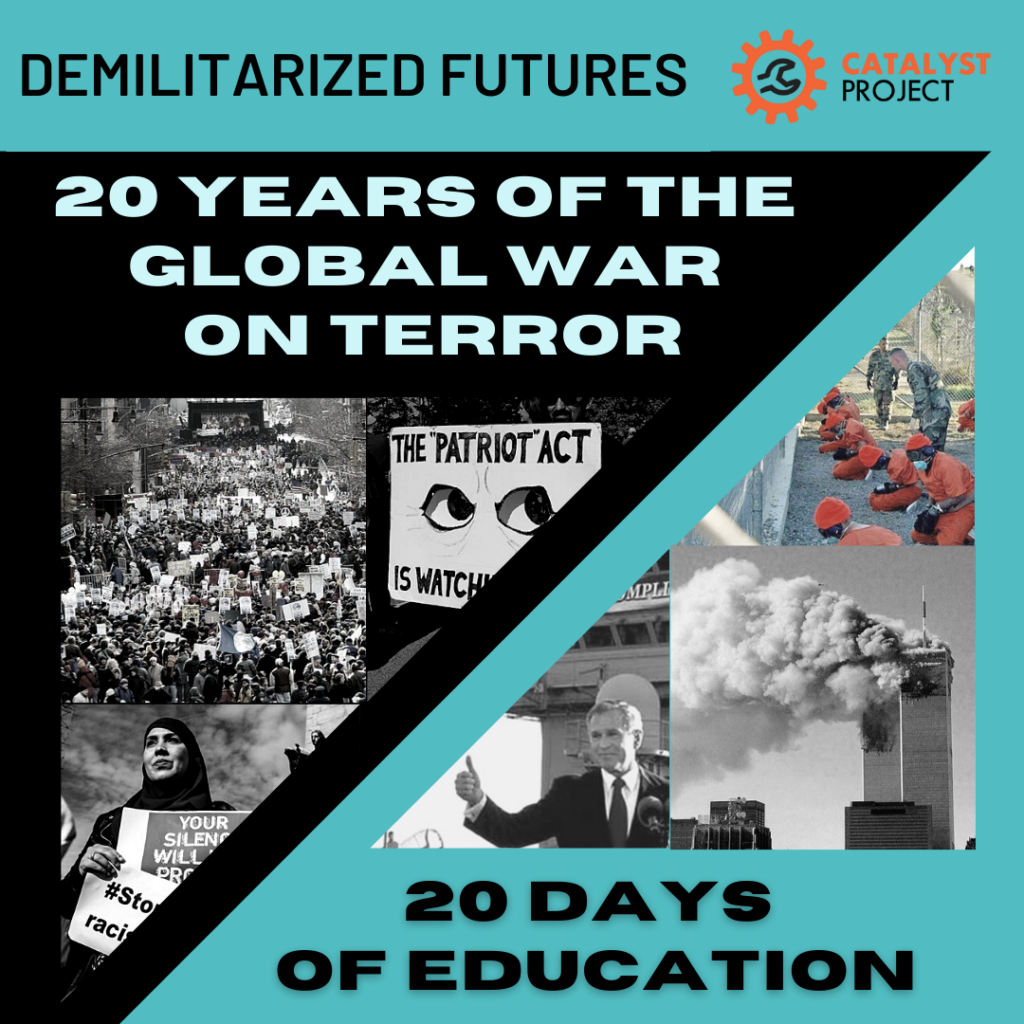
Ending the Global War on Terror means demilitarization. That means demilitarization of economy, culture, and governance. These are big challenges, but organizers of color have developed grassroots plans and platforms that can guide us. These frameworks support us to understand how demilitarization can look, to recognize where different threads of that work have already been happening for a long time, and what we can fight for right now!
Some visionary resources we recommend on demilitarized futures are:
- The Feminist Peace Initiative Platform
- The Vision for Black LIves Platform
- Abolishing the War on Terror, Building Communities of Care Grassroots Policy Agenda (yesterday’s primary resource)
In the spirit of transnational solidarity, we can look to demilitarization work and organizing in other countries from Afghanistan to Iraq, from Colombia to Japan.
As we wrap up this series, we are reminded that our survival depends on whether we can build true transnational solidarity. That is the antidote to the Global War on Terror. That is where our future lies.
Finally, we close out this series with a poem by Naomi Shihab Nye: Gate A-4
Additional Resources:
- “A Feminist Vision for Genuine Security and Creating a Culture of Life,” from the transPacific alliance International Women’s Alliance Against Militarism
- Video interview (transcribed in English) with Christian Peñuela from a conscientious objectors’ collective in Bogota Colombia on militarism after peace accords
